高中英语倒装句
图片预览

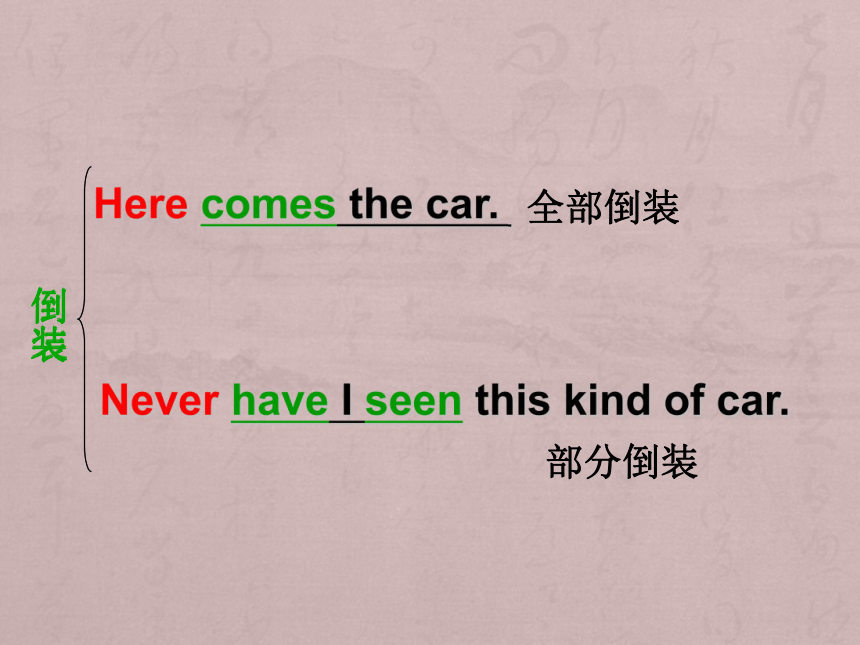
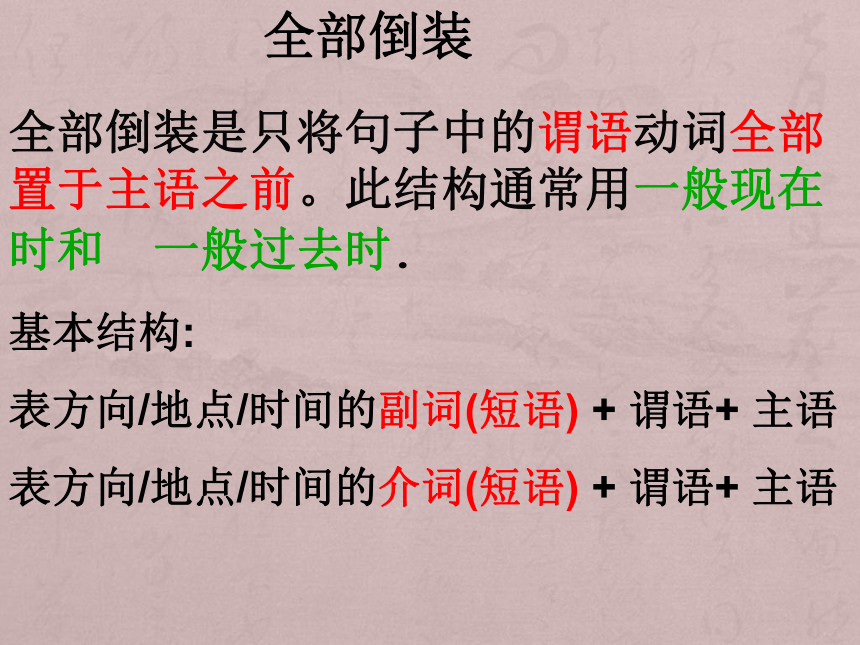

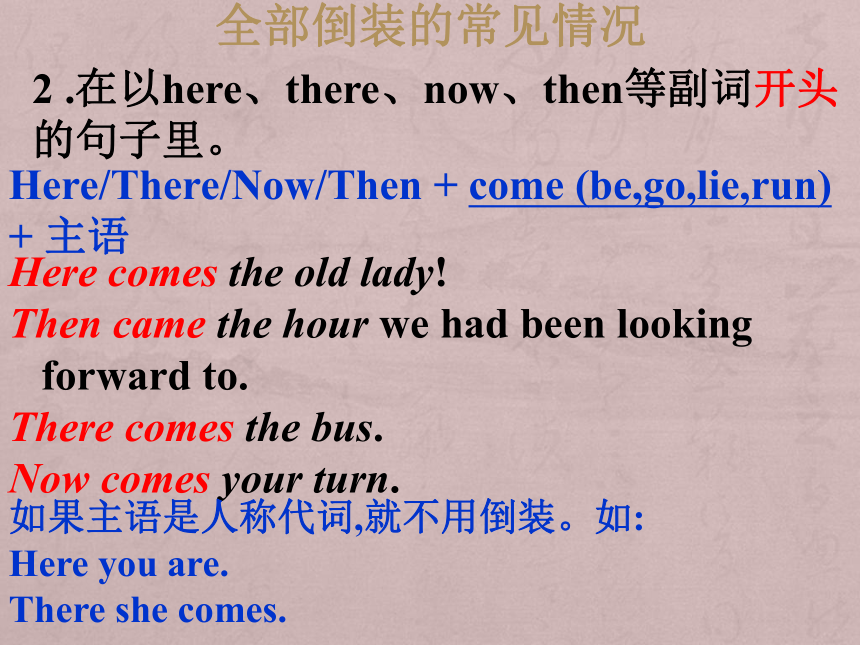

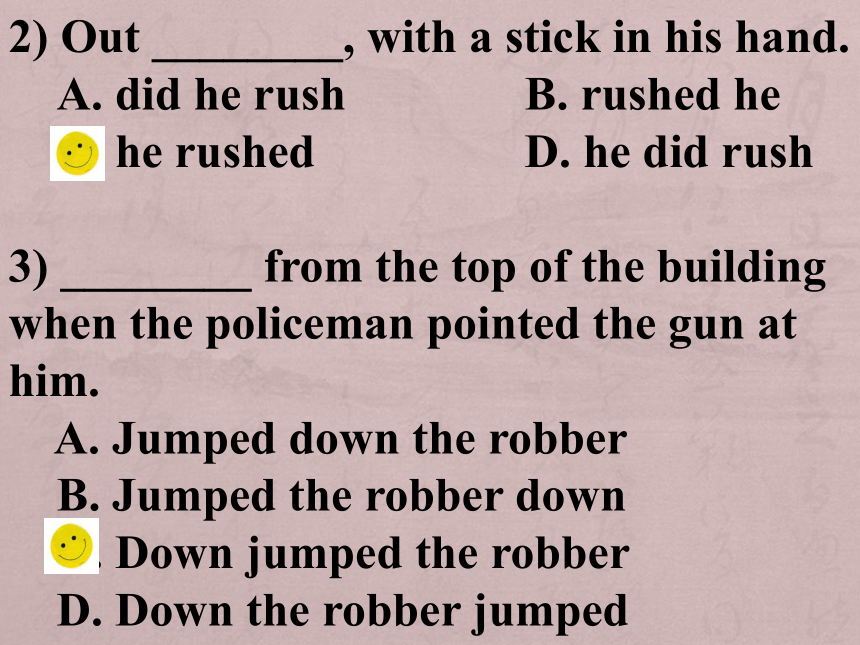
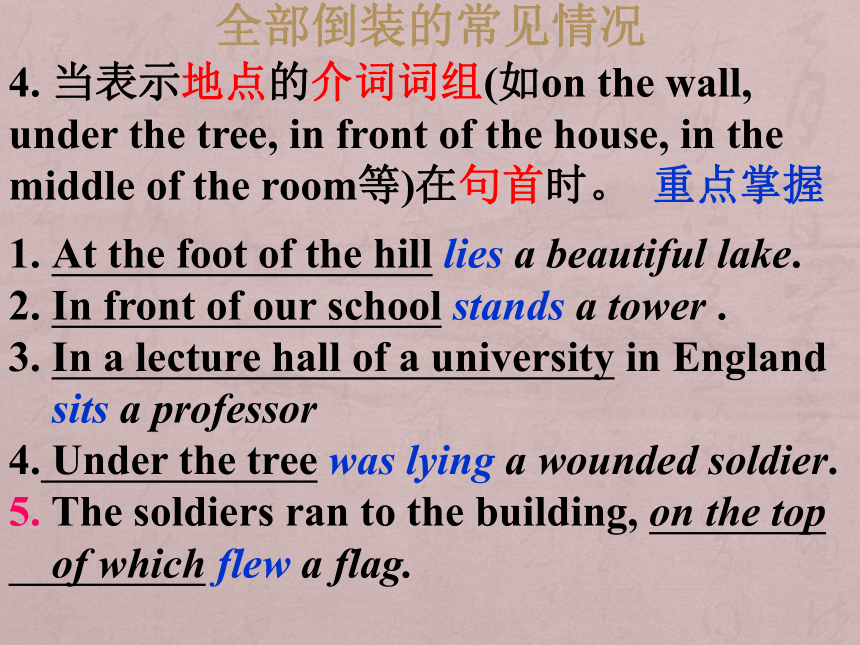
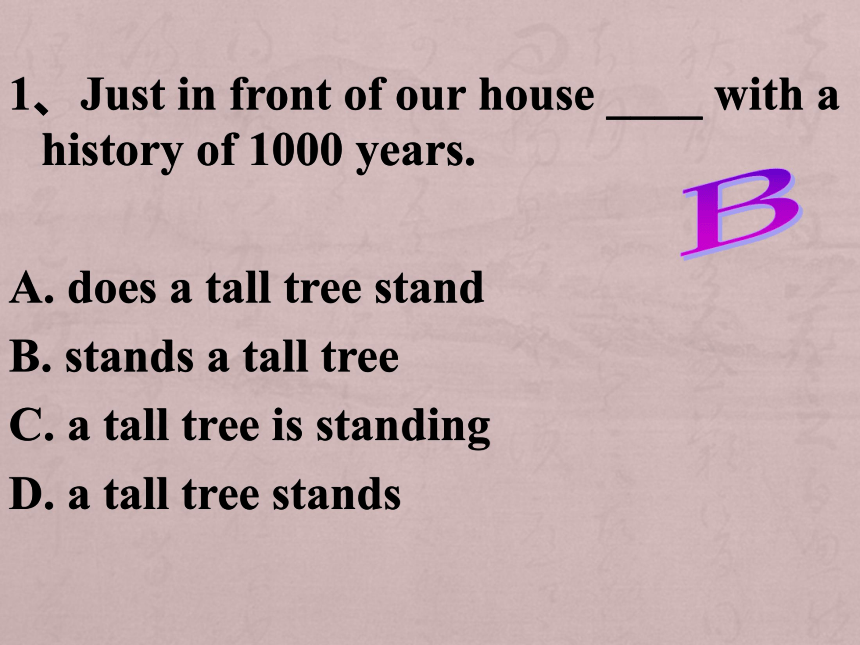
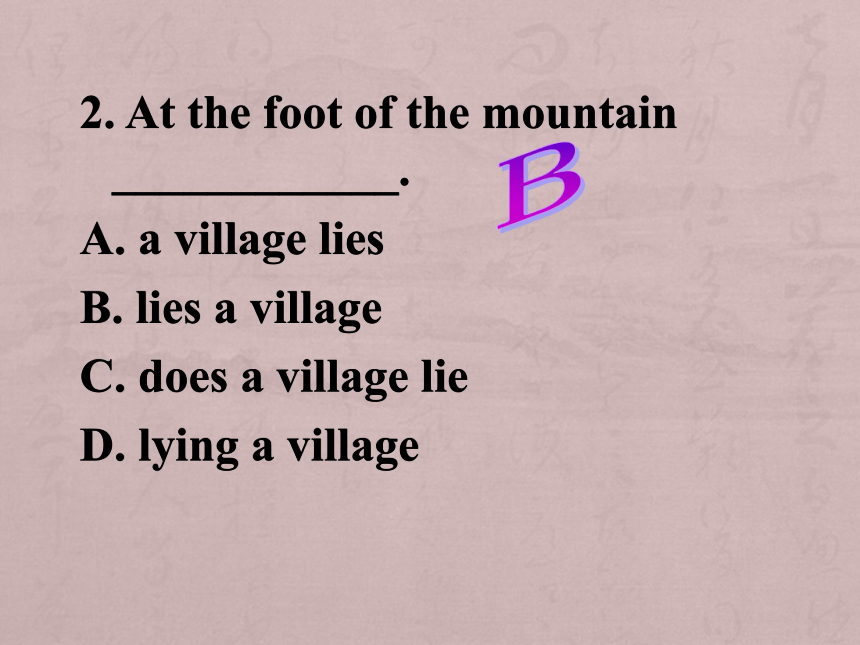
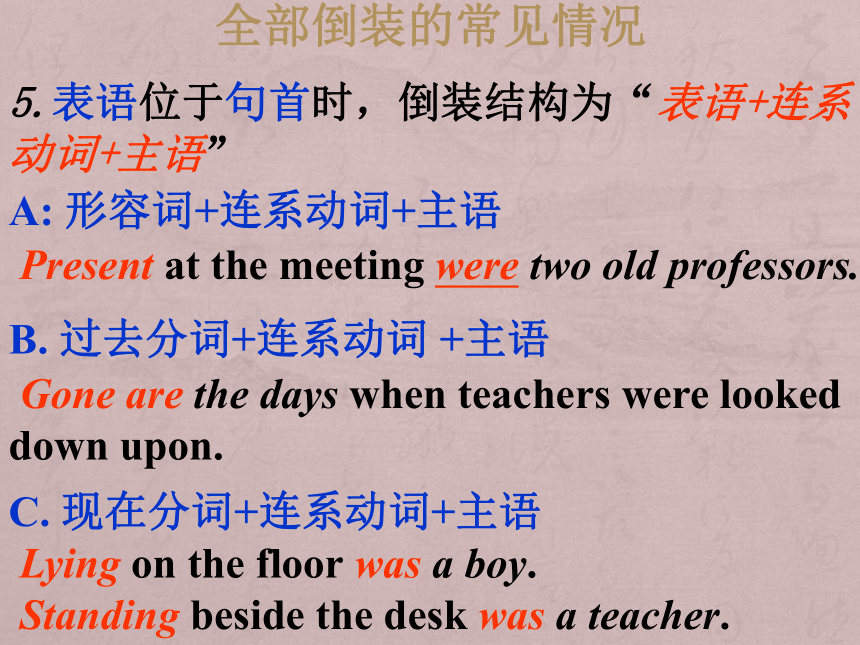

文档简介
(共62张PPT)
Inversion
倒装
Here comes the car.
Never have I seen this kind of car.
全部倒装
部分倒装
全部倒装是只将句子中的谓语动词全部置于主语之前。此结构通常用一般现在时和 一般过去时.
全部倒装
基本结构:
表方向/地点/时间的副词(短语) + 谓语+ 主语
表方向/地点/时间的介词(短语) + 谓语+ 主语
There be 句型(be可换成 live, stand, lie,
come, exist, seem, appear 等).
There are so many cars coming and going on
the road.
There lies a temple on the top of the mountain.
There stood a dog before him.
There exist different opinions on this question.
2 .在以here、there、now、then等副词开头的句子里。
Here/There/Now/Then + come (be,go,lie,run) + 主语
Here comes the old lady! Then came the hour we had been looking
forward to. There comes the bus. Now comes your turn.
如果主语是人称代词,就不用倒装。如: Here you are. There she comes.
全部倒装的常见情况
3. 表示方向的副词out, in, up, down等置于句首,要用全部倒装。谓语常用come,go,rush,等不及物动词. 如果主语是人称代词,就不用倒装。如:
In came Mr. White. Up went the arrow into the air. Away went the boy.
1) There ________. And here ________. A. goes the phone; she comes
B. is the phone going; is she C. does the phone go; does she come
D. the phone goes; come she
全部倒装的常见情况
2) Out ________, with a stick in his hand. A. did he rush B. rushed he
C. he rushed D. he did rush
3) ________ from the top of the building when the policeman pointed the gun at him. A. Jumped down the robber
B. Jumped the robber down C. Down jumped the robber
D. Down the robber jumped
4. 当表示地点的介词词组(如on the wall, under the tree, in front of the house, in the middle of the room等)在句首时。 重点掌握
1. At the foot of the hill lies a beautiful lake. 2. In front of our school stands a tower .
3. In a lecture hall of a university in England
sits a professor
4. Under the tree was lying a wounded soldier.
5. The soldiers ran to the building, on the top
of which flew a flag.
全部倒装的常见情况
1、Just in front of our house ____ with a history of 1000 years.
A. does a tall tree stand
B. stands a tall tree
C. a tall tree is standing
D. a tall tree stands
2. At the foot of the mountain ____________.
A. a village lies
B. lies a village
C. does a village lie
D. lying a village
Present at the meeting were two old professors.
A: 形容词+连系动词+主语
Gone are the days when teachers were looked down upon.
B. 过去分词+连系动词 +主语
5.表语位于句首时,倒装结构为“表语+连系动词+主语”
全部倒装的常见情况
C. 现在分词+连系动词+主语
Lying on the floor was a boy.
Standing beside the desk was a teacher.
部分倒装
部分倒装是把be动词、情态动词、助动词放到主语之前。如果句子中没有这些词,要在主语之前加助动词do / does / did等,而把原来的谓语动词变成原形放在主语之后。
基本结构: 即 一般疑问句结构
be动词/情态动词(can/could/should…)/do-does-did/ has-have-had + 主语 + 其他…
1.only所修饰的副词、介词短语或状语从句放在句首时, 要进行部分倒装,如:
Only then did I realize the importance of learning English.
Only in this way can you hope to improve the situation there.
Only after he came back was I able to see him.
注:only修饰主语,仍用自然语序,如:
Only socialism can save China.
1. Only in this way ____ make progress in your English.
A. you will B. can you
C. you are able to D. will you able to
Only when the meeting was over___ go back to meet his friend. A. he could B. he was able to
C. was he able to D. can he
B
C
2. 具有否定意义的单词 (never , neither/nor not, seldom, hardly, little, nowhere, by no means, in no time等)或短语(by no means, under no circumstances, in no way, at no time, on no account等 ) 放在句首时,主谓要部分倒装.
Not a word did I say to him. Never have I found him so happy. Little does he care about what I said. I can't swim. Neither can he.
这里绝不允许你吸烟。(allow)
At no time ________________smoke here
are you allowed to
将下列句子改为倒装句.
I seldom go to the cinema.
Seldom do I go to the cinema.
I knew little about it.
Little did I know about it.
You will find the answer to this question
nowhere.
Nowhere will you find the answer to this question.
3. 下列结构用部分倒装. 原则: 前倒后不倒
Hardly/scarcely + had sb. done…when sb. did…
No sooner + had sb. done …than sb. did…
Not only(句首) … but also……
1.Hardly / Scarcely had he fallen asleep when
a loud knock at the door awaked him.
2. No sooner had I reached the station than the
train moved.
3. Not only is he interested in football but
also he plays it well.
他一睡着,敲门声就吵醒了他.
我一到车站火车就开动了.
4. Not until放在句首,从句不倒装,主句倒装。
直到他的妈妈回来,他才完成作业。
He didn’t finish his homework until his mother came back.
Not until his mother came back did he finish his homework.
主倒从不倒
直到孩子睡着了,妈妈才离开房间.
The mother didn’t leave the room until the child fell asleep.
Not until the child fell asleep did the mother leave the room.
直到那时他才意识到问题的严重性.
Not until then did he realize the importance of the problem.
注意:It is/was not until …that…(在强调句中不倒装)
正是直到三年后他们才毕业.
It was not until three years later that they graduated.
1. So loudly did he speak that even people in the next room could hear him .
2. So small were the words that he could hardly see them .
3. Such an interesting film was it that we were all deeply moved .
5. So\such…that 句型中,以so\such 开头的句子中,主句要部分倒装
So +adj./adv. +部分倒装 + that ……
light travels so fast that it is difficult for us to imagine its speed.
So fast does light travel that it is difficult for us to imagine its speed.
这个问题是如此难以回答以至于他把它搁在一边. (so)
__________________________to answer that he left it aside.
It was such a difficult question to answer that..
=such a difficult question was it to answer that
he left it aside.
So difficult was the question
6. as(尽管)引导的让步状语从句要用倒装语序
由as/though引导的让步状语从句中,其基本句式为:
1. n(不带冠词)/adj/ adv+ as/though +主语+谓语
2. 动词原形+as/though+主语+情态动词
Child as he is, he knows a lot about the world.
Young as he is, he knows more than you.
Old as they were,…
Hard as he tried, …
Try as I might, …
尽管他跑得很快
尽管他努力学习
尽管这幅画看上去很美丽
尽管他表演的很成功
尽管这个计划可能会失败
尽管她很肥胖
尽管他是一个聪明的孩子
用as将下列句子翻译成倒装句:
Fast as he ran,
Hard as he studied,
Beautiful as the picture looks,
Successfully as he performed,
Fail as the plan might,
Fat as she is,
Clever child as he is,
An athlete who competed in Beijing Olympics talked about his experience in Beijing:
Before I went to China, 对北京我几乎一无所知. I felt nothing about it. After I arrived, most of my time was spent on training and competing.我从未学过中文. As a result,I did not go out. 我也不敢跟北京人说话. My roommate said Sanlitun was great so the day before leaving, I went there. What a shock! 我很少见到这么多的人.What was more shocking, the salesgirls could speak so good English and the goods were so cheap. 我决不会浪费这次机会. In a few minutes, my wallet was empty but my hands were full. 只有到那个时候我才喜欢上了北京.
Little do I know about Beijing.
Hardly do I know about Beijing.
2. Never had I studied Chinese.
3. Seldom did I see so many people.
4. Neither dare I speak to Beijingers.
5. Never would I miss the chance.
By no means/ In no case would I miss
the chance.
6. Not until then did I fall in love with Beijing.
优化方案: p 62 完成句子
1. have the old couple quarreled
2. is the number of planets
3. should we do anything
4. do the children become
5. stupid as it sounded
6. did we expect
7. so is the atmosphere
8. could I make (any) sense
9. Following are comments
10. in front of which lies
倒装和强调
1. will we be able to solve / settle
2. has he played
3. that he was saved
4. are the days when
5. come the rest of our guests
6. that I made sense of
7. are you allowed to smoke
8. where it was that
9. suddenly did the earthquake occur
that
10. stands a tall tree
11. Foolish as he looks
12. curious were the couple about wild
plants.
13. that matters
14. did she become aware / was she aware
15. It was not until she had taken off
16. had he set out to
17. the students were absorbed in
18. nor/neither do I care
19. can he get through
20. have I ever imagined (that)
21. great progress had I made
22. that might have informed us of
23. rather than knowledge that
24. is information provided
25. it is the same with my sister
26. we have finished
27. can we ignore the fact that
28. did they succeed in solving / settling
29. It was our being late
30. would people be permitted
An athlete who competed in Beijing Olympics talked about his experience in Beijing:
Before I went to China, 对北京我几乎一无所知. I felt nothing about it. After I arrived, most of my time was spent on training and competing.我从未学过中文. As a result,I did not go out. 我也不敢跟北京人说话. My roommate said Sanlitun was great so the day before leaving, I went there. What a shock! 我很少见到这么多的人.What was more shocking, the salesgirls could speak so good English and the goods were so cheap. 我决不会浪费这次机会. In a few minutes, my wallet was empty but my hands were full. 只有到那个时候我才喜欢上了北京.
Little do I know about Beijing.
Hardly do I know about Beijing.
2. Never had I studied Chinese.
3. Seldom did I see so many people.
4. Neither dare I speak to Beijingers.
5. Never would I miss the chance.
By no means/ In no case would I miss
the chance.
6. Not until then did I fall in love with Beijing.
虚拟语气倒装句(非真实条件句中省略if连词的倒装结构 )
下回分解!
uu
4、as/ though (虽然,尽管)引导的让步状语从句
名词\形容词\副词\动词\分词+as\though+主语+其他
Although I am ugly, I am gentle.
Ugly as I am, I am gentle.
Though he is a child, he has to make a living.
Child as he is, he has to make a living.
注意:从句的表语是名词,其名词前不加任何冠词
Though I like you much, I will never marry you .
Much as I like you , I will never marry you .
Although she might try, she could not pass the exam.
Try though she might , she could not pass the exam.
Though he was surrounded by the enemy, he was not afraid.
Surrounded though he was by the enemy, he was not afraid.
_______, his idea was accepted by all the people at the meeting. [2007 重庆]
A. Strange as might it sound
B. As it might sound strange
C. As strange it might sound
D. Strange as it might sound
5.用于so nor neither 开头的句子
此类倒装用于重复前句部分内容
前句是肯定句用SO 某人/某事也是
前句是否定句用neither nor某人/某事也不是
倒装句中的谓语应与前句的谓语时态形态一致
He has been to Beijing. So have I.
Tom can’t answer the question. Neither /Nor can I .
So +be/助动词/情态动词+主语
某人也是如此
Nor/neither +be/助动词/情态动词+主语
某人也不是如此
So +主语+be/助动词/情态动词
某人确实如此
Betty is a nice girl. So she is .
2. 他喜欢读书,我也是.
He likes reading very much. So do I .
3. 我从来没有去过广州大学,他也是.
I have never been to Guangzhou University, neither/ nor has he.
1. ---Do you know Jim quarreled with his brother
---I don’t know, _______.
A. nor don’t I care
B. nor do I care
C. I don’t care neither
D. I don’t care also
配套练习
Ⅰ. Multiple choices.
高考真题再现:
(1) --I would never come to this restaurant again. The food is terrible.
--______! (全国卷,32)
Nor I am B. Neither would I
C. Same with me D. So do I
B
易错题:
1、I wonder if your wife will go to the ball. If your wife _____, so _____ mine.
does , will B. will, does
C. will, would D. does, do
2、--I seldom watch TV, but listen to the radio a lot.
-- _____.
So do I B. Neither do I
C. So I have D. So it is with me.
A
D
6.在 hardly/scarcely/…when; no sooner…than; not only … but also;so...that; such…that 的倒装句中,前倒后不倒.
hardly/scarcely/ no sooner后句子的谓语用had done, when/than后句子的谓语用一般过去时
(3) Not only is he interested in football but
also he plays it well.
(1) Hardly / Scarcely had he fallen asleep when a
loud knock at the door awaked him.
(2) No sooner had I reached the station than train
moved.
(4)So hard does he work that he has made great
progress in English.
典型例题: No sooner___ than it began to rain heavily. A. the game began
B. has the game begun C. did the game begin
D. had the game begun
答案:D
7. If 虚拟条件从句中.从句有(were/should/had)
(1)If I were you, I would work hard.
(2) If it should rain tomorrow, we would put off
our meeting.
(3)If he had followed my advice, he would have
succeeded.
Were I you, I would work hard.
Should it rain tomorrow, we would put
off our meeting.
Had he followed my advice, he would
have succeeded.
Were it not for his teacher’s help, he would never graduate from this high school.
注意:我们可以说Were it not...或者Had it not been..., 但不可以说Weren’ t it... 或者hadn’t it been...
If it were not for his teacher’s help, he would never graduate from this high school.
_______five minutes earlier, you could have seen
them off.
A. If you should arrive B. If you arrive
C. Had you arrived D. Should you arrive
C
May you succeed.祝你成功!
倒装
倒装句的高考考点:
全部倒装
部分倒装
1. 在以here、there、now、then、off、away等副词开头的句子里。
2. 表示地点的介词短语位于句首时。
1、Only+状语位于句首时
2.否定副词或短语位于句首时
3、在省去if的虚拟条件从句 中
4、So\ Neither\ Nor 位于句首时
5、as引导的让步状语从句
6、特殊句式
虽然他是个孩子,但他懂得很多。
只有用这种方式我们才能提高我们的英语水平。
直到他失去健康,他才意识到好的身体意味着什么。
Child as he is, he knows a lot.
Only in this way can we improve our English.
Not until he lost his health did he realize what good health meant.
高考
链接
1. Not until all the fish died in the river ____
how serious the pollution was.
did the villagers realize
B. the villagers realized
C. the villagers realized
D. didn’t the villagers realize
2. Only in this way _____ to make
improvement in the operating system.
you can hope B. you did hope
C. can you hope D. did you hope
3. If Joe’s wife won’t go to the party,
____. (2007 全国II)
A. he will either B. neither will he
C. he neither will D. either he will
4. — My room gets very cold at night.
— ___________. (2007 江苏)
A. So is mine B. So mine is
C. So does mine D. So mine does
5. Not a single song _____ at yesterday’s
party. (2000上海)
A. she sang B. sang she
C. did she sing D. she did sing
6. —It was careless of you to have left your
clothes outside all night.
—My God! ______. (1997上海)
A. So did I B. So I did
C. So were you D. So did you
7. I finally got the job I dreamed about.
Never in all my life so happy______.
(2000北京春)
did I feel B. I felt
C. I had felt D. had I felt
8. Maybe you have been to many countries,
but nowhere else ________ such a
beautiful palace. (2004辽宁)
A. can you find B. you could find
C. you can find D. could you find
Inversion
倒装
Here comes the car.
Never have I seen this kind of car.
全部倒装
部分倒装
全部倒装是只将句子中的谓语动词全部置于主语之前。此结构通常用一般现在时和 一般过去时.
全部倒装
基本结构:
表方向/地点/时间的副词(短语) + 谓语+ 主语
表方向/地点/时间的介词(短语) + 谓语+ 主语
There be 句型(be可换成 live, stand, lie,
come, exist, seem, appear 等).
There are so many cars coming and going on
the road.
There lies a temple on the top of the mountain.
There stood a dog before him.
There exist different opinions on this question.
2 .在以here、there、now、then等副词开头的句子里。
Here/There/Now/Then + come (be,go,lie,run) + 主语
Here comes the old lady! Then came the hour we had been looking
forward to. There comes the bus. Now comes your turn.
如果主语是人称代词,就不用倒装。如: Here you are. There she comes.
全部倒装的常见情况
3. 表示方向的副词out, in, up, down等置于句首,要用全部倒装。谓语常用come,go,rush,等不及物动词. 如果主语是人称代词,就不用倒装。如:
In came Mr. White. Up went the arrow into the air. Away went the boy.
1) There ________. And here ________. A. goes the phone; she comes
B. is the phone going; is she C. does the phone go; does she come
D. the phone goes; come she
全部倒装的常见情况
2) Out ________, with a stick in his hand. A. did he rush B. rushed he
C. he rushed D. he did rush
3) ________ from the top of the building when the policeman pointed the gun at him. A. Jumped down the robber
B. Jumped the robber down C. Down jumped the robber
D. Down the robber jumped
4. 当表示地点的介词词组(如on the wall, under the tree, in front of the house, in the middle of the room等)在句首时。 重点掌握
1. At the foot of the hill lies a beautiful lake. 2. In front of our school stands a tower .
3. In a lecture hall of a university in England
sits a professor
4. Under the tree was lying a wounded soldier.
5. The soldiers ran to the building, on the top
of which flew a flag.
全部倒装的常见情况
1、Just in front of our house ____ with a history of 1000 years.
A. does a tall tree stand
B. stands a tall tree
C. a tall tree is standing
D. a tall tree stands
2. At the foot of the mountain ____________.
A. a village lies
B. lies a village
C. does a village lie
D. lying a village
Present at the meeting were two old professors.
A: 形容词+连系动词+主语
Gone are the days when teachers were looked down upon.
B. 过去分词+连系动词 +主语
5.表语位于句首时,倒装结构为“表语+连系动词+主语”
全部倒装的常见情况
C. 现在分词+连系动词+主语
Lying on the floor was a boy.
Standing beside the desk was a teacher.
部分倒装
部分倒装是把be动词、情态动词、助动词放到主语之前。如果句子中没有这些词,要在主语之前加助动词do / does / did等,而把原来的谓语动词变成原形放在主语之后。
基本结构: 即 一般疑问句结构
be动词/情态动词(can/could/should…)/do-does-did/ has-have-had + 主语 + 其他…
1.only所修饰的副词、介词短语或状语从句放在句首时, 要进行部分倒装,如:
Only then did I realize the importance of learning English.
Only in this way can you hope to improve the situation there.
Only after he came back was I able to see him.
注:only修饰主语,仍用自然语序,如:
Only socialism can save China.
1. Only in this way ____ make progress in your English.
A. you will B. can you
C. you are able to D. will you able to
Only when the meeting was over___ go back to meet his friend. A. he could B. he was able to
C. was he able to D. can he
B
C
2. 具有否定意义的单词 (never , neither/nor not, seldom, hardly, little, nowhere, by no means, in no time等)或短语(by no means, under no circumstances, in no way, at no time, on no account等 ) 放在句首时,主谓要部分倒装.
Not a word did I say to him. Never have I found him so happy. Little does he care about what I said. I can't swim. Neither can he.
这里绝不允许你吸烟。(allow)
At no time ________________smoke here
are you allowed to
将下列句子改为倒装句.
I seldom go to the cinema.
Seldom do I go to the cinema.
I knew little about it.
Little did I know about it.
You will find the answer to this question
nowhere.
Nowhere will you find the answer to this question.
3. 下列结构用部分倒装. 原则: 前倒后不倒
Hardly/scarcely + had sb. done…when sb. did…
No sooner + had sb. done …than sb. did…
Not only(句首) … but also……
1.Hardly / Scarcely had he fallen asleep when
a loud knock at the door awaked him.
2. No sooner had I reached the station than the
train moved.
3. Not only is he interested in football but
also he plays it well.
他一睡着,敲门声就吵醒了他.
我一到车站火车就开动了.
4. Not until放在句首,从句不倒装,主句倒装。
直到他的妈妈回来,他才完成作业。
He didn’t finish his homework until his mother came back.
Not until his mother came back did he finish his homework.
主倒从不倒
直到孩子睡着了,妈妈才离开房间.
The mother didn’t leave the room until the child fell asleep.
Not until the child fell asleep did the mother leave the room.
直到那时他才意识到问题的严重性.
Not until then did he realize the importance of the problem.
注意:It is/was not until …that…(在强调句中不倒装)
正是直到三年后他们才毕业.
It was not until three years later that they graduated.
1. So loudly did he speak that even people in the next room could hear him .
2. So small were the words that he could hardly see them .
3. Such an interesting film was it that we were all deeply moved .
5. So\such…that 句型中,以so\such 开头的句子中,主句要部分倒装
So +adj./adv. +部分倒装 + that ……
light travels so fast that it is difficult for us to imagine its speed.
So fast does light travel that it is difficult for us to imagine its speed.
这个问题是如此难以回答以至于他把它搁在一边. (so)
__________________________to answer that he left it aside.
It was such a difficult question to answer that..
=such a difficult question was it to answer that
he left it aside.
So difficult was the question
6. as(尽管)引导的让步状语从句要用倒装语序
由as/though引导的让步状语从句中,其基本句式为:
1. n(不带冠词)/adj/ adv+ as/though +主语+谓语
2. 动词原形+as/though+主语+情态动词
Child as he is, he knows a lot about the world.
Young as he is, he knows more than you.
Old as they were,…
Hard as he tried, …
Try as I might, …
尽管他跑得很快
尽管他努力学习
尽管这幅画看上去很美丽
尽管他表演的很成功
尽管这个计划可能会失败
尽管她很肥胖
尽管他是一个聪明的孩子
用as将下列句子翻译成倒装句:
Fast as he ran,
Hard as he studied,
Beautiful as the picture looks,
Successfully as he performed,
Fail as the plan might,
Fat as she is,
Clever child as he is,
An athlete who competed in Beijing Olympics talked about his experience in Beijing:
Before I went to China, 对北京我几乎一无所知. I felt nothing about it. After I arrived, most of my time was spent on training and competing.我从未学过中文. As a result,I did not go out. 我也不敢跟北京人说话. My roommate said Sanlitun was great so the day before leaving, I went there. What a shock! 我很少见到这么多的人.What was more shocking, the salesgirls could speak so good English and the goods were so cheap. 我决不会浪费这次机会. In a few minutes, my wallet was empty but my hands were full. 只有到那个时候我才喜欢上了北京.
Little do I know about Beijing.
Hardly do I know about Beijing.
2. Never had I studied Chinese.
3. Seldom did I see so many people.
4. Neither dare I speak to Beijingers.
5. Never would I miss the chance.
By no means/ In no case would I miss
the chance.
6. Not until then did I fall in love with Beijing.
优化方案: p 62 完成句子
1. have the old couple quarreled
2. is the number of planets
3. should we do anything
4. do the children become
5. stupid as it sounded
6. did we expect
7. so is the atmosphere
8. could I make (any) sense
9. Following are comments
10. in front of which lies
倒装和强调
1. will we be able to solve / settle
2. has he played
3. that he was saved
4. are the days when
5. come the rest of our guests
6. that I made sense of
7. are you allowed to smoke
8. where it was that
9. suddenly did the earthquake occur
that
10. stands a tall tree
11. Foolish as he looks
12. curious were the couple about wild
plants.
13. that matters
14. did she become aware / was she aware
15. It was not until she had taken off
16. had he set out to
17. the students were absorbed in
18. nor/neither do I care
19. can he get through
20. have I ever imagined (that)
21. great progress had I made
22. that might have informed us of
23. rather than knowledge that
24. is information provided
25. it is the same with my sister
26. we have finished
27. can we ignore the fact that
28. did they succeed in solving / settling
29. It was our being late
30. would people be permitted
An athlete who competed in Beijing Olympics talked about his experience in Beijing:
Before I went to China, 对北京我几乎一无所知. I felt nothing about it. After I arrived, most of my time was spent on training and competing.我从未学过中文. As a result,I did not go out. 我也不敢跟北京人说话. My roommate said Sanlitun was great so the day before leaving, I went there. What a shock! 我很少见到这么多的人.What was more shocking, the salesgirls could speak so good English and the goods were so cheap. 我决不会浪费这次机会. In a few minutes, my wallet was empty but my hands were full. 只有到那个时候我才喜欢上了北京.
Little do I know about Beijing.
Hardly do I know about Beijing.
2. Never had I studied Chinese.
3. Seldom did I see so many people.
4. Neither dare I speak to Beijingers.
5. Never would I miss the chance.
By no means/ In no case would I miss
the chance.
6. Not until then did I fall in love with Beijing.
虚拟语气倒装句(非真实条件句中省略if连词的倒装结构 )
下回分解!
uu
4、as/ though (虽然,尽管)引导的让步状语从句
名词\形容词\副词\动词\分词+as\though+主语+其他
Although I am ugly, I am gentle.
Ugly as I am, I am gentle.
Though he is a child, he has to make a living.
Child as he is, he has to make a living.
注意:从句的表语是名词,其名词前不加任何冠词
Though I like you much, I will never marry you .
Much as I like you , I will never marry you .
Although she might try, she could not pass the exam.
Try though she might , she could not pass the exam.
Though he was surrounded by the enemy, he was not afraid.
Surrounded though he was by the enemy, he was not afraid.
_______, his idea was accepted by all the people at the meeting. [2007 重庆]
A. Strange as might it sound
B. As it might sound strange
C. As strange it might sound
D. Strange as it might sound
5.用于so nor neither 开头的句子
此类倒装用于重复前句部分内容
前句是肯定句用SO 某人/某事也是
前句是否定句用neither nor某人/某事也不是
倒装句中的谓语应与前句的谓语时态形态一致
He has been to Beijing. So have I.
Tom can’t answer the question. Neither /Nor can I .
So +be/助动词/情态动词+主语
某人也是如此
Nor/neither +be/助动词/情态动词+主语
某人也不是如此
So +主语+be/助动词/情态动词
某人确实如此
Betty is a nice girl. So she is .
2. 他喜欢读书,我也是.
He likes reading very much. So do I .
3. 我从来没有去过广州大学,他也是.
I have never been to Guangzhou University, neither/ nor has he.
1. ---Do you know Jim quarreled with his brother
---I don’t know, _______.
A. nor don’t I care
B. nor do I care
C. I don’t care neither
D. I don’t care also
配套练习
Ⅰ. Multiple choices.
高考真题再现:
(1) --I would never come to this restaurant again. The food is terrible.
--______! (全国卷,32)
Nor I am B. Neither would I
C. Same with me D. So do I
B
易错题:
1、I wonder if your wife will go to the ball. If your wife _____, so _____ mine.
does , will B. will, does
C. will, would D. does, do
2、--I seldom watch TV, but listen to the radio a lot.
-- _____.
So do I B. Neither do I
C. So I have D. So it is with me.
A
D
6.在 hardly/scarcely/…when; no sooner…than; not only … but also;so...that; such…that 的倒装句中,前倒后不倒.
hardly/scarcely/ no sooner后句子的谓语用had done, when/than后句子的谓语用一般过去时
(3) Not only is he interested in football but
also he plays it well.
(1) Hardly / Scarcely had he fallen asleep when a
loud knock at the door awaked him.
(2) No sooner had I reached the station than train
moved.
(4)So hard does he work that he has made great
progress in English.
典型例题: No sooner___ than it began to rain heavily. A. the game began
B. has the game begun C. did the game begin
D. had the game begun
答案:D
7. If 虚拟条件从句中.从句有(were/should/had)
(1)If I were you, I would work hard.
(2) If it should rain tomorrow, we would put off
our meeting.
(3)If he had followed my advice, he would have
succeeded.
Were I you, I would work hard.
Should it rain tomorrow, we would put
off our meeting.
Had he followed my advice, he would
have succeeded.
Were it not for his teacher’s help, he would never graduate from this high school.
注意:我们可以说Were it not...或者Had it not been..., 但不可以说Weren’ t it... 或者hadn’t it been...
If it were not for his teacher’s help, he would never graduate from this high school.
_______five minutes earlier, you could have seen
them off.
A. If you should arrive B. If you arrive
C. Had you arrived D. Should you arrive
C
May you succeed.祝你成功!
倒装
倒装句的高考考点:
全部倒装
部分倒装
1. 在以here、there、now、then、off、away等副词开头的句子里。
2. 表示地点的介词短语位于句首时。
1、Only+状语位于句首时
2.否定副词或短语位于句首时
3、在省去if的虚拟条件从句 中
4、So\ Neither\ Nor 位于句首时
5、as引导的让步状语从句
6、特殊句式
虽然他是个孩子,但他懂得很多。
只有用这种方式我们才能提高我们的英语水平。
直到他失去健康,他才意识到好的身体意味着什么。
Child as he is, he knows a lot.
Only in this way can we improve our English.
Not until he lost his health did he realize what good health meant.
高考
链接
1. Not until all the fish died in the river ____
how serious the pollution was.
did the villagers realize
B. the villagers realized
C. the villagers realized
D. didn’t the villagers realize
2. Only in this way _____ to make
improvement in the operating system.
you can hope B. you did hope
C. can you hope D. did you hope
3. If Joe’s wife won’t go to the party,
____. (2007 全国II)
A. he will either B. neither will he
C. he neither will D. either he will
4. — My room gets very cold at night.
— ___________. (2007 江苏)
A. So is mine B. So mine is
C. So does mine D. So mine does
5. Not a single song _____ at yesterday’s
party. (2000上海)
A. she sang B. sang she
C. did she sing D. she did sing
6. —It was careless of you to have left your
clothes outside all night.
—My God! ______. (1997上海)
A. So did I B. So I did
C. So were you D. So did you
7. I finally got the job I dreamed about.
Never in all my life so happy______.
(2000北京春)
did I feel B. I felt
C. I had felt D. had I felt
8. Maybe you have been to many countries,
but nowhere else ________ such a
beautiful palace. (2004辽宁)
A. can you find B. you could find
C. you can find D. could you find
